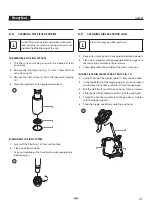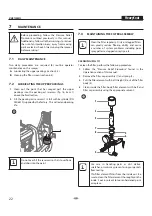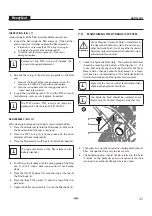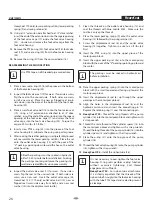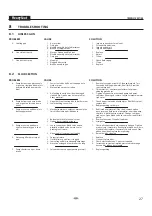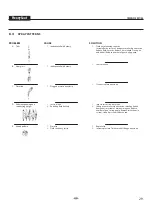
17
OPERATION
HeavyCoat
4.5
PAINTING
1.
Place the siphon hose into a container of paint.
2.
Place the bleed hose into a metal waste container.
3.
Turn the pressure control knob fully counterclockwise to
its lowest pressure setting (Fig. 10, item 1).
4.
Open the bleed valve (2) by turning it fully counterclockwise.
5.
Start the engine or turn on the electric motor:
a. To start the gas engine, follow the steps in section 4.2
b. To start the electric motor, push and hold the ON/OFF
switch (3) in the ON position until the electric motor is at
full speed, then release the switch.
6.
Turn the pressure control knob (Fig. 10, item 1) clockwise
approximately 1/3 of the way down to increase pressure
until the sprayer cycles evenly and solvent flows freely
from the bleed hose.
7.
Turn off the sprayer.
a. To turn off the gas engine,
• set the pressure to minimum by turning the pressure
control knob fully counterclockwise,
• move the throttle lever to the slow position, and
• turn the engine switch to the OFF position.
b. To turn off the electric motor,
• set the pressure to minimum by turning the pressure
control knob fully counterclockwise,
• move the ON/OFF switch to the OFF position.
8.
Remove the bleed hose from the waste container and
place it into the container of paint.
9.
Close the bleed valve by turning it fully clockwise.
10.
Start the engine or turn on the electric motor.
11.
Turn the pressure control knob clockwise approximately
1/3 of the way down to increase pressure.
12.
Unlock the gun by turning the gun trigger lock to the
unlocked position.
Ground/Earth the gun by holding it against
the edge of the metal container while flushing.
Failure to do so may lead to a static electric
discharge, which may cause a fire.
13.
Trigger the gun into the metal waste container until all
air and solvent is flushed from the spray hose and paint is
flowing freely from the gun.
14.
Lock the gun by turning the gun trigger lock to the locked
position.
15.
Turn off the sprayer.
16.
Attach tip guard and tip to the gun as instructed by the tip
guard or tip manuals.
POSSIBLE INJECTION HAZARD. Do not spray
without the tip guard in place. Never trigger the
gun unless the tip is in either the spray or the
unclog position. Always engage the gun trigger
lock before removing, replacing or cleaning tip.
17.
Start the engine or turn on the electric motor.
18.
Increase the pressure by turning the pressure control knob
slowly clockwise and test the spray pattern on a piece of
cardboard. Adjust the pressure control knob until the
spray from the gun is completely atomized.
i
Turning the pressure up higher than needed to
atomize the paint will cause premature tip wear
and additional overspray.
4.6
PRESSURE RELIEF PROCEDURE
Be sure to follow the Pressure Relief Procedure
when shutting the unit down for any purpose,
including servicing or adjusting any part of the
spray system, changing or cleaning spray nozzles,
or preparing for cleanup.
1.
Lock the spray gun by turning the gun trigger lock to the
locked position.
2.
Turn off the sprayer.
a. To turn off the gas engine,
• set the pressure to minimum by turning the pressure
control knob fully counterclockwise,
• move the throttle lever to the slow position, and
• turn the engine switch to the OFF position.
b. To turn off the electric motor,
• set the pressure to minimum by turning the pressure
control knob fully counterclockwise,
• move the ON/OFF switch to the OFF position.
3.
Unlock the gun by turning the gun trigger lock to the
unlocked position (refer to spray gun manual).
4.
Hold the metal part of the gun firmly to the side of a metal
waste container to ground/earth the gun and avoid a build
up of static electricity.
5.
Trigger the gun to remove any pressure that may still be
in the hose.
6.
Lock the gun by turning the gun trigger lock to the locked
position (refer to spray gun manual).
7.
Place the bleed hose into the metal waste container.
8.
Open the bleed valve by turning it fully counterclockwise.



















